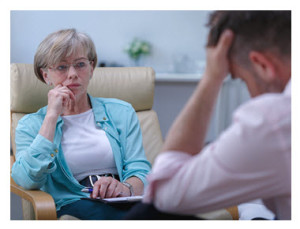 I am fascinated by this article in The New York Times: Why Therapists Should Talk Politics. Think about it. If you’re depressed or disillusioned with the state of the world (or your country), shouldn’t your emotions be situated in a sociopolitical context?
I am fascinated by this article in The New York Times: Why Therapists Should Talk Politics. Think about it. If you’re depressed or disillusioned with the state of the world (or your country), shouldn’t your emotions be situated in a sociopolitical context?
Those who are unemployed or underemployed are frequently frightened, angry, weary… and if the situation persists for months and even years, won’t many turn their anger inward and lose confidence? Act out? Blame themselves? Accept the blame of others? Won’t they see their relationships deteriorate, as well as their dreams?
Shouldn’t a shrink be willing to converse on social and economic issues, or at least to allow the subject matter to peel away from the usual inward therapeutic themes, and out into the societal light where the causes may better belong?
This is the premise in the opinion piece that appears in a regular Times column called “Couch.” It’s a thoughtful read, an excellent read, and I wonder if there aren’t millions of us functioning through an increasingly debilitating disillusionment about our country’s values, worsened by the display of hatred fueled by this election year.
How could we not be livid, concerned, or depressed?
Richard Brouillette LCSW writes:
Typically, therapists avoid discussing social and political issues in sessions. If the patient raises them, the therapist will direct the conversation toward a discussion of symptoms, coping skills, the relevant issues in a patient’s childhood and family life. But I am growing more and more convinced that this is inadequate…
Why is this inadequate?
Because social issues that significantly alter our lives not only leave us dealing with the consequences, but the residual sense of powerlessness that leads us to shoulder the blame. And blame is unproductive.
Brouillette continues:
When people can’t live up to the increasingly taxing demands of the economy, they often blame themselves and then struggle to live with the guilt…
This is no different at the social level. When an economic system or government is responsible for personal harm, those affected can feel profoundly helpless, and cover that helplessness with self-criticism. Today, if you can’t become what the market wants, it can feel as if you are flawed and have no recourse except to be depressed.
… these changes in the workplace have been slowly taking a psychological toll, though in a more diffuse, less detectable way than with any one traumatic event. To a degree that they may not be aware of, people feel less hope and more stress; their self-regard is damaged; they believe they are fated to take what they can get; they exist in a state approaching learned helplessness.
Right on point, don’t you think?
And it isn’t just the guilt that people struggle with. In addition to the tangible (material and logistical) impacts, certainly, extended unemployment, underemployment and extreme financial stress will shred confidence in skills and self-worth; undermine identity; lead to physical as well as mental health problems; and encourage us to isolate ourselves, though we know that isolation worsens depression.
 I look back on my 30 years of working life and consider myself as well as the people I know. I see salary levels that have effectively remained stagnant for decades, administrative support that has been stripped away, the increasing daily pressure of “downsizing” or “reduction in force” or “rightsizing” that has ratcheted up stress levels, the ever-tighter time constraints and larger loads for employees, and the contingent / portfolio workforce that we’ve seen explode in the past decade, as independent (contractor) status pushes insecurity and stress to new heights.
I look back on my 30 years of working life and consider myself as well as the people I know. I see salary levels that have effectively remained stagnant for decades, administrative support that has been stripped away, the increasing daily pressure of “downsizing” or “reduction in force” or “rightsizing” that has ratcheted up stress levels, the ever-tighter time constraints and larger loads for employees, and the contingent / portfolio workforce that we’ve seen explode in the past decade, as independent (contractor) status pushes insecurity and stress to new heights.
Consider this:
There comes a time when people can’t take it anymore… Unfortunately, many therapists, because they have been trained not to discuss political issues in the consulting room, are part of the problem, implicitly reinforcing false assumptions about personal responsibility, isolation and the social status quo.
The social status quo. That’s an interesting expression. I am reminded of how the barrage of social media can skew our perceptions and make us feel inadequate. I am reminded how frequently we face, fight, and ultimately accept “lousy” as good enough. We have rebranded mediocrity in everything from customer service to relationships. I don’t know about you, but I find mediocrity depressing.
Listen. This is not a defense of deflecting responsibility. Of course our attitudes and actions can assist in spurring us on or holding us back. And yes, I have my positive mantras, and I understand my role in life’s daily ups and downs. Moreover, one-on-one, most of the people I encounter are decent and polite, perhaps brandishing a bit of bravado, but otherwise like so many of us — fearful in some ways (but not all) beneath the swagger or mask, and fearless when it comes to protecting our families.
Yet when we’re living not only with the knowledge that the game is rigged for so many, but with a growing and uneasy sensation of futility in trying to fight it, isn’t that when we must be able to say it aloud? Isn’t that when we should dig deep and fight harder? Isn’t that when politics — at every level — cannot be ignored?
I don’t normally cite so much text from a single source, as among other things, it’s bad form. But I hoped to catch your interest, and I urge you to read this Times Opinionator column in its entirety. As you do, keep in mind the vast ripple effects that flow from political action (or inaction), that we are deeply affected by politics in our personal lives, that ignoring what’s happening around us changes nothing, and that we are not always personally responsible for the difficulties we face.
A positive attitude may help but it will not conquer all, it can only be sustained for so long and with support, and the reality of social and economic issues dictates far more about our quality of life and emotional well-being than we may like to admit.
Can we factor this reality into how we deal with each other and likewise, civil discourse — and not just on the psychiatrist’s couch?
You May Also Enjoy
The world is getting more complex all the time and, at least in the U.S., our society is becoming more and more ill prepared to deal with it. I have to agree that therapists are not helping their clients if they use a model which by default assumes they are the cause of all their own problems.
One of the ways I identify myself professionally is as a systems thinker with an interest in complexity. A structural assumption of systems thinking is that any problem is affected by a context larger than the one which can be readily seen or assumed (in this case, what can be readily seen or assumed is the client himself). Another assumption is that the actions of an individual are limited compared to the power of all the affecting systems (which create the larger contexts just mentioned).
So I have to agree that psychotherapists are falsely blaming the victim and creating unrealistic expectations when they focus on the least powerful element in the system (the client), and ask them to be responsible for larger factors beyond their control.
Individuals are really many steps down in chains of events which take their choices away, so any counseling approaches which don’t recognize this are doing a disservice. For instance, we commonly assumed that people have largely unlimited choices of who to vote for, or what jobs to take. But those choices have already been limited by factors outside of the patient’s control, like election processes, trade agreements, etc.
But I have to wonder how much a therapist could reasonably be expected to know, or how far they could expand the scope of the conversations. They could certainly do so to the extent described by the referenced article. In addition to asking to be up on all the latest advances in psychotherapy, plus maybe a little in the way of brain science, they could benefit from some knowledge of sociology, economics and systems as well. Hopefully they would at least have a broader conceptual picture than the average man in the street.
But if we use current political discourse as an overall barometer of our nation’s causal understanding, we have no ability to have any but the most elementary conceptions of cause and effect, not to mention ones which are more conceptual, or go against simplistic preconceived notions. The majority of our politicians, the electorate, and the media which covers it all, are all relatively primitive in their ideas of how things work.
Meanwhile, in the educational realm, the great perceived need is to have more science, technology, engineering and math. At one time, a liberal arts education which provided an ability to read inferences, make moral comparisons, consider the pros and cons of respective choices – in other words all of the basic thinking skills needed for competent social navigation – was valued. Now it is considered fluff. The concept of systems thinking is at least recognized in some aspects of science and engineering, but even that is only in college. In my opinion, that (as well as the subject of complexity) are concepts which should be formally taught from early grades on.
Unfortunately, even something so apparently innocuous and clearly needed is controversial. In North Carolina in 2012, members of the Winston-Salem/Forsyth County Board of Education proposed adding systems thinking to the curriculum but were opposed by other members who contend that since the technique takes a global view of the world, it would subject the students to a socialist political agenda.
Robert you made me chuckle and I agree. I must say that the current election has now made me a ‘reality tv” watcher as I cannot believe what the media, pundits and politicians are saying and doing. Simplistic and primitive indeed. The current election is a train wreck, causing an interstate pile up, in a trailer park, with tornados on the horizon and media all over. I can’t help but watch. That said I am not sure what any of these people’s platforms are as they never seem to report that. I guess I will have to look into this.
This is a simple one for me….NO!